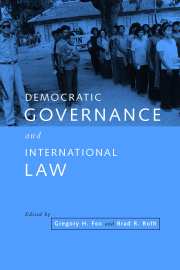Book contents
- Frontmatter
- Contents
- List of contributors
- List of acknowledgments
- Introduction: the spread of liberal democracy and its implications for international law
- PART I THE NORMATIVE FOUNDATIONS OF A RIGHT TO POLITICAL PARTICIPATION
- PART II DEMOCRACY AND INTER-STATE RELATIONS
- PART III DEMOCRACY AND THE USE OF FORCE
- PART IV DEMOCRATIZATION AND CONFLICTING IMPERATIVES
- 12 Intolerant democracies
- 13 Whose intolerance, which democracy?
- 14 Democratic intolerance: observations on Fox and Nolte
- 15 A defense of the “intolerant democracies” thesis
- 16 Democracy and accountability: the criss-crossing paths of two emerging norms
- PART V CRITICAL APPROACHES
- Index
12 - Intolerant democracies
Published online by Cambridge University Press: 04 May 2010
- Frontmatter
- Contents
- List of contributors
- List of acknowledgments
- Introduction: the spread of liberal democracy and its implications for international law
- PART I THE NORMATIVE FOUNDATIONS OF A RIGHT TO POLITICAL PARTICIPATION
- PART II DEMOCRACY AND INTER-STATE RELATIONS
- PART III DEMOCRACY AND THE USE OF FORCE
- PART IV DEMOCRATIZATION AND CONFLICTING IMPERATIVES
- 12 Intolerant democracies
- 13 Whose intolerance, which democracy?
- 14 Democratic intolerance: observations on Fox and Nolte
- 15 A defense of the “intolerant democracies” thesis
- 16 Democracy and accountability: the criss-crossing paths of two emerging norms
- PART V CRITICAL APPROACHES
- Index
Summary
If there be any among us who wish to dissolve this union, or to change its republican form, let them stand undisturbed, as monuments of the safety with which error of opinion may be tolerated where reason is left free to combat it.
Thomas JeffersonThis will always remain one of the best jokes of democracy, that it gave its deadly enemies the means by which it was destroyed.
Joseph GoebbelsINTRODUCTION
How should a democracy react to the presence of anti-democratic actors in its midst? Debate over this question could hardly involve a broader set of issues. Looking to history, the twentieth century provides examples of totalitarian parties attaining power through democratic elections, and thereafter dismantling their countries' democratic institutions. Yet there are also societies in which toleration of anti-democratic actors appears to have diminished their popular appeal. Turning to political theory, some scholars conceive of democracy as an essentially procedural idea, one in which open debate and electoral competition among all ideological factions serves as the touchstone of democratic legitimacy. Others posit a substantive conception of democracy holding, in Rawls's terminology, that democratic societies need not tolerate the intolerant. And in the discipline of comparative politics, scholars debate whether democracy in some societies is so fragile that it cannot withstand vigorous popular appeals by its committed opponents.
- Type
- Chapter
- Information
- Democratic Governance and International Law , pp. 389 - 435Publisher: Cambridge University PressPrint publication year: 2000
- 18
- Cited by

